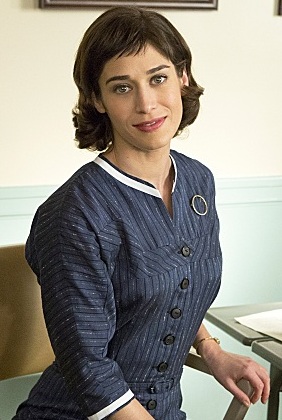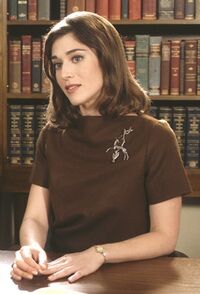Régine Walras: Difference between revisions
mNo edit summary |
mNo edit summary |
||
| Line 29: | Line 29: | ||
Régine joined the [[People's Army (Gylias)|People's Army]] in 1945. She worked as a volunteer nurse, and gained additional training and knowledge from her experiences. | Régine joined the [[People's Army (Gylias)|People's Army]] in 1945. She worked as a volunteer nurse, and gained additional training and knowledge from her experiences. | ||
She mostly remained in Etra, but was assigned on some occasions to {{wpl|field hospital}}s. During one of these, she met Nora Everett, who she later married. She took part in [[Communal assemblies (Gylias)|revolutionary assemblies]] and was a delegate to the [[Free Territories (Gylias)#The General Council|General Council]]. | She mostly remained in Etra, but was assigned on some occasions to {{wpl|field hospital}}s. During one of these, she met Nora Everett, who she later married. On another occasion, she attended to [[Maria Caracciolo]] in her last moments. She took part in [[Communal assemblies (Gylias)|revolutionary assemblies]] and was a delegate to the [[Free Territories (Gylias)#The General Council|General Council]]. | ||
Towards the end of the [[Liberation War (Gylias)|Liberation War]], [[Darnan Cyras]] invited Régine to join the post-war [[Cabinet of Gylias#History|Executive Committee]] to handle the health portfolio. She accepted, and chose to join the {{G-SP}} on the advice of [[Rin Tōsaka]] and [[Sakura Tōsaka]]. | Towards the end of the [[Liberation War (Gylias)|Liberation War]], [[Darnan Cyras]] invited Régine to join the post-war [[Cabinet of Gylias#History|Executive Committee]] to handle the health portfolio. She accepted, and chose to join the {{G-SP}} on the advice of [[Rin Tōsaka]] and [[Sakura Tōsaka]]. | ||
Revision as of 11:03, 5 November 2019
Régine Walras | |
|---|---|
 | |
| Minister of Health of Gylias | |
| In office 2 January 1958 – 5 March 1976 | |
| Prime Minister | Darnan Cyras |
| Personal details | |
| Born | 19 October 1929 Etra, Alscia |
| Political party | Socialist Party |
| Occupation | Physician |
Régine Walras (Gylic transcription: Rejin Valras; born 19 October 1929) is a Gylian physician and politician. She was Gylias' health minister in the Darnan Cyras government. She spearheaded the creation of the National Health System.
Early life
Régine Walras was born on 19 October 1929 in Etra. She was an only child, and her parents were medical professionals. Originally, her parents couldn't decide whether to name her "Régine" or "Virginie", and wrote both names on her birth certificate. Later in life, she legally changed her name, removing "Virginie".
Régine's parents ran a clinic in Etra, and she began helping from an early age. She learned the basics of medicine and nursing from her parents as she grew up.
Alscia's incorporation into the Free Territories ended her formal education. Instead, she learned in volunteer classes and lectures. By her teenage years, she was helping her parents perform venipunctures and injections, and prepare anesthetics.
She once responded to a foreign media outlet criticising a Gylianime series for violent content by saying: "I spent my childhood seeing people's blood and guts. It just made me want to be a doctor."
Régine joined the People's Army in 1945. She worked as a volunteer nurse, and gained additional training and knowledge from her experiences.
She mostly remained in Etra, but was assigned on some occasions to field hospitals. During one of these, she met Nora Everett, who she later married. On another occasion, she attended to Maria Caracciolo in her last moments. She took part in revolutionary assemblies and was a delegate to the General Council.
Towards the end of the Liberation War, Darnan Cyras invited Régine to join the post-war Executive Committee to handle the health portfolio. She accepted, and chose to join the Socialist Party on the advice of Rin Tōsaka and Sakura Tōsaka.
Minister of Health
Régine took office with the rest of the Executive Committee on 2 January 1958. Aged 28, she was its fifth youngest member. Her post was retroactively renamed "Minister of Health" when the Constitution was adopted in 1961.
Régine spearheaded the creation of the National Health System, and worked to coordinate the services inherited from the Free Territories. An ardent supporter of universal health care, she brought the majority of health facilities into public ownership, ensuring the only private ones that remained were anarchist ones.
She observed she had a fortunate context for her policies: 20 years of the Free Territories had already practically destroyed profit-based private healthcare, and had produced a radicalised medical profession that could be counted on to support radical initiatives.
Régine helped organise the NHS as a federal system, with the Ministry of Health determining overall health policy and regulation, while delivery of services were transferred to municipal and regional governments. She advocated democratic and local control of health care, with funding covered by the federal government.
She abhorred the idea of paying for medical services, and pushed the hardest for pharmacy to be nationalised, even against some colleagues' worries whether the system would work. The public monopoly on medicine distribution and its provision for free was one of her signature achievements.
Régine was characterised by colleague Akane Tsunemori as a "radical bulldozer" of the cabinet: despite her low-key public image, she was "disconcertingly open to using her office to crush opposition". Famously, she adopted one of Tyran's strictest vaccination policies, and imposed brutal penalties for vaccine hesitancy, reaching up to "expulsion from the community" and permanently removing children from vaccine-resisting parents to be given to foster care or adoption.
In her speeches on the topic, she employed vituperative, dehumanising rhetoric against opponents of vaccination. She once bluntly said, "The policy of the government is the extermination of anti-vaccinism, no matter what it takes." Although her policies are credited with increasing Gylias' herd immunity and helping prevent severe outbreaks of infectious disease, her fanaticism on crushing resistance to vaccination affected her reputation abroad.
Régine took a strong interest in integrating health care with other aspects of social security to improve public well-being. She declared in Parliament: "Medicine is an inherently socialist profession, and must be practised socialistically. Our goal isn't merely to cure the individual, it's to create a healthy society."
She oversaw the complete deinstitutionalisation of mental health care — completing a process begun in the Free Territories — and the destruction of former psychiatric hospitals, which she condemned as totalitarian and dehumanising institutions. Psychiatric care was transferred to community services, with the Ministry assuming responsibility for coordination and funding of the system.
She compiled the landmark Régine Walras Report of 1970, the first government report to acknowledge health promotion as equally important to conventional medicine. Building on the report, she was the driving force behind the organisation of the International Conference on Primary Health Care in Etra in 1975, which produced the Etra Declaration that underlined the importance of primary health care and called for urgent action to achieve the goal of "Health for All by 2000".
Collaborating with the Controlled Substances Administration, the NHS became a pioneer in using psychopharmacology, especially to treat mental disorders and chronic pain. Régine expressed optimism about the potential of well-regulated responsible drug use, feeling that psychedelics and hallucinogens in particular could help break down destructive old ideas and contribute to the emergence of a new, more peaceful and enlightened society.
She notably emphasised reproductive health and reproductive justice in health policy. Notable policies included free provision of birth control and family planning through the NHS, collaborating in provision of sex education, criminalising non-consensual genital mutilations to protect intersex people, free provision of therapies and surgeries for transgender persons, and aiming for the earliest possible detection of gender dysphoria and beginning of transitioning.
Based on the success of the Hermes Programme, Régine proposed a "Hermes Programme for Health". However, the scheme could not be implemented due to the constraints of contemporary computer technology. Nevertheless, it made an important contribution to the NHS' adoption of health informatics, and it later achieved fruition with the adoption of electronic health records and growth of e-health.
Public image
Compared to some of her colleagues, Régine did not have a distinctive public image or appearance. She largely saw herself as a theorist, delegating routine administration to more qualified civil servants, and sought to maintain focus on her work, not her personality.
Reportedly, when once told she had been named one of Tyran's best-dressed cabinet ministers by a fashion magazine, she quipped, "What, did they already go through the entire cabinet?"
Within the Darnan Cyras government, her best relations were with fellow French minister Julie Legrand. She enjoyed Julie's flamboyant and extroverted personality, and once commented, "I would've loved to have turned out like that."
Retirement
Régine left politics at the end of her term. She returned to Etra and working as a nurse, doing so until retiring in 1989.
She occasionally made interventions in public life, opposing the Aén Ďanez government, appearing in the 1999 documentary Nation Building, and supporting the development of e-health starting in the 1990s. Otherwise, she lives in quiet retirement with her family.
Personal life
Régine married Nora Everett, a Schottian volunteer nurse, in 1958. They have two children. They retained their names after marriage, since they disliked the tradition of changing surnames on marriage, and didn't want to hyphenate them.
Régine describes herself as an atheist. She is a vocal opponent of alternative medicine, for-profit healthcare, and quackery.
